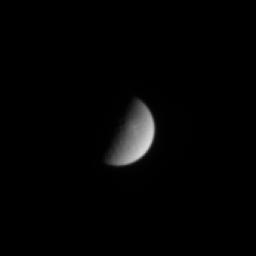
|
Receding Rhea
- Click the image above for a larger view
- Full-Res JPEG (348 x 348) (2.5 kB)
- Full-Res TIFF (348 x 348) (23.6 kB)
Caption:
This view of Saturn's icy moon Rhea shows hints of its heavily cratered surface, including a bright feature near the terminator (day-night boundary). Cassini was, at the time, speeding away from the Saturn system on its initial long, looping orbit.
The image was taken in visible light with the Cassini spacecraft narrow angle camera on July 15, 2004, from a distance of about 5.1 million kilometers (3.2 million miles) from Rhea. The Sun-Rhea-spacecraft, or phase angle of the image is 90 degrees. The image scale is 31 kilometers (19 miles) per pixel. The image has been magnified by a factor of two to aid visibility.
Background Info:
The Cassini-Huygens mission is a cooperative project of NASA, the European Space Agency and the Italian Space Agency. The Jet Propulsion Laboratory, a division of the California Institute of Technology in Pasadena, manages the Cassini-Huygens mission for NASA's Office of Space Science, Washington, D.C. The Cassini orbiter and its two onboard cameras, were designed, developed and assembled at JPL. The imaging team is based at the Space Science Institute, Boulder, Colo.
For more information, about the Cassini-Huygens mission visit, http://saturn.jpl.nasa.gov and the Cassini imaging team home page, http://ciclops.org .
Cataloging Keywords:
| Name | Value | Additional Values |
|---|---|---|
| Target | Rhea | Saturn |
| System | Saturn | |
| Target Type | Satellite | Planet |
| Mission | Cassini-Huygens | |
| Instrument Host | Cassini Orbiter | |
| Host Type | Orbiter | |
| Instrument | Imaging Science Subsystem (ISS) | |
| Detector | Narrow Angle Camera | |
| Extra Keywords | Crater, Grayscale, Visual | |
| Acquisition Date | ||
| Release Date | 2004-08-10 | |
| Date in Caption | 2004-07-15 | |
| Image Credit | NASA/JPL/Space Science Institute | |
| Source | photojournal.jpl.nasa.gov/catalog/PIA05431 | |
| Identifier | PIA05431 | |
